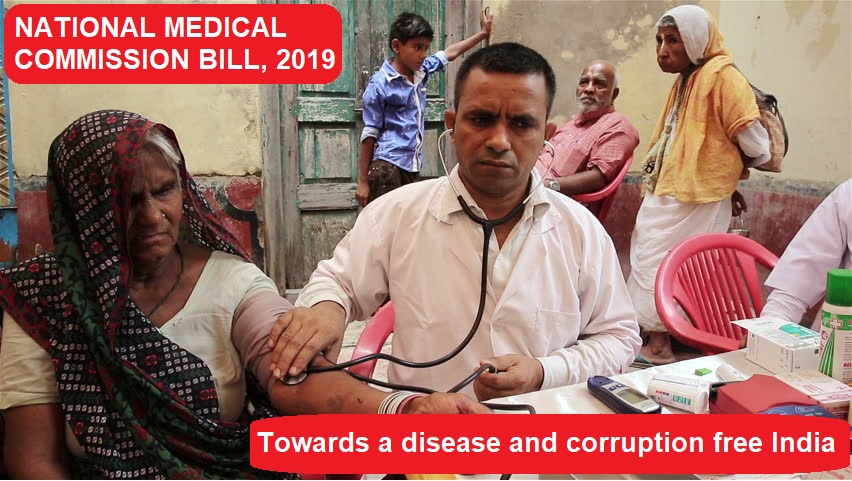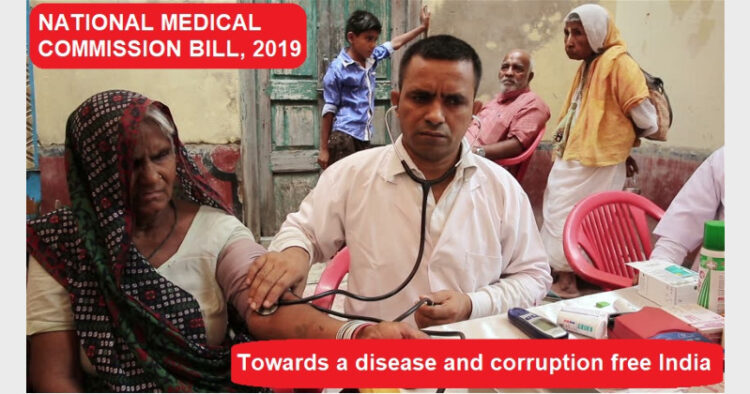The motto of the Narendra Modi led government has been ‘Sarve Bhavantu Sukhinah..’ thus enthusing the lawmakers to strive towards a disease free and corruption free India. To uphold this ideology, The National Medical Commission is a step in the right direction.
– Adhikari Narendra Bhusan Mallick

The Rajya Sabha having passed the National Medical Commission Bill amidst hue and cry by the opposition, has envisioned to bring in sweeping reforms to the medical education & is set to become a monumental step in revolutionising and achieving universal healthcare , promoting quality in healthcare, upholding the slogan of minimum government, maximum governance and creating a cadre of qualified doctors for advancing towards a disease and corruption free India. Thus in Toto achieving the slogan “Sabka Saath , Sabka Vikas”.
Reason for introducing the Bill
The Medical Council Of India , a colonial relic later reconstituted under Indian Medical Council Act, 1956 had been infested with corruption, malpractices thus producing incompetent doctors, giving rise to lack of innovativeness in medical education , dismally sustaining the low doctor to population ratio and giving rise to geographic maldistribution of medical colleges were certain issues central to its lackadaisical approach. This overburdened body suffered a severe blow when its President Ketan Desai , was arrested for accepting bribes to the tune of 2 crores for granting recognition to a private college.
The present dispensation under the vibrant leadership of Shri Narendra Modi , in a bid to introduce sweeping reforms in Medical education brought in The National Medical Commission Bill, 2019 which without any doubts was welcomed with deficient sloganeering of opposition and protests of doctors.
So, what are the concerns of the opposition and medical fraternity at large?
The concerns are regarding few clauses which are:
● Clause 4 : The opposition’s demand of increasing the representation of States from the prescribed 6 to 15 in the 25 member body.
● Clause 10 : which states, The National Medical Commission shall “frame guidelines for determination of fees and all other charges in respect of 50 percent of seats in private medical institutions and deemed to be universities which are governed under the provisions of the act.
● Clause 15 : A new NEXT exam (National Exit Test) and it’s necessity.
● Clause 32 : Provides for Introduction of “Community Health Providers” in the system. The medical fraternity believes this would open the floodgates for the quacks to flourish in the system.
● Clause 45 : The statement ,” The decision of the Central Government whether a question is one of policy or not shall be final “. The opposition and medical professionals are wary of the unrestricted powers to be exercised by the central government over the commission.
Taking into consideration the reservations of the concerned parties against the bill we find that as we go through the texts the government has dropped several issues outlined in the National Medical Commission Bill 2017 and has reformed the new bill holistically thus making the National Medical Commission more inclusive, representative and providing voices to states departing from the narrow representation in Medical Council Of India. Moreover MCI was an elected body where it’s members were elected by medical practitioners themselves i.e , the regulator is elected by the regulated. A clear case of conflict of interest.
The very idea of increasing the representation of states from six to fifteen is an idea poor in thought. This is so because the opposition under the garb of colourful terms like “representation, federal setup” , is focusing on quantity over quality which is a risky game as it may push the decision making exercise of NMC into deep slumber and aid it in having a peaceful demise. Which obviously isn’t the purpose !!!.
The cacophony prevailing over the NEXT exam should we discouraged. The intention of the government shouldn’t be looked down with suspicion at least. Over the past several years the blossoming of several private institutes in medical sector with gloomy infrastructure, lack of experienced faculties , has diluted the quality of students graduating from colleges. NEXT exam wouldn’t just only prepare them to commit justice to their duties as medical practitioners after graduation it would also invite qualified and erudite foreign nationals to practice as medical practitioners, thus setting up robust , experienced, motivated health professionals willing to walk the extra mile in providing health care services to the poorest of the poor in the country.
In the National Medical Commission Bill 2017, the Indian Medical Association was quite disconcerted, disillusioned of the Bridge Course provided in the bill to enable AYUSH practitioners prescribe modern medicines. This idea was met with protests and was alleged that the government wishes to dilute meritocracy in the system. How insane is it !!!. In a country as diversified as India still reeling under poor infrastructure in health where we are striving to make healthcare more available ideas such as this are discouraged. The government had to finally drop the idea of bridge course leading to death of a revolutionary step just to satisfy some professionals who would have accused the government of fascism if the ideas weren’t heeded to. In the 2019 version of the bill the commission introduced the provision of providing license to practice medicine to people connected with modern scientific medical profession at mid level as “community health provider” . Some from the medical fraternity have considered this provision as legalising quacks and providing them the license to kill. This allegation is without any substance. In the bill, clause 32 (3) Clearly mentions,“The Community Health Provider may prescribe specified medicine independently, only in primary and preventive healthcare, but in cases other than primary and preventive healthcare, he may prescribe medicine only under the supervision of medical practitioners.”. This statement itself would have warded off doubts.
As the current doctor to population ratio in India is at a dismal 1:1613 against a WHO norm of 1:1000. The variability in time and space in the availability of doctors takes a huge toll on the life of people. If a pharmacist or a nurse who has been practicing for years is allowed to prescribe drugs in primary and preventive care through formulation of certain protocols and training then they could address health issues even in the remotest of the areas in the country (Countries like the USA and UK have such models).
Despite attractive remuneration and other allowances few doctors agree to serve in the remotest corners of the country. With an unpalatable infant mortality rate , maternal Mortality rate , stress of communicable diseases prevalent in the country and rural urban divide in seeping in of medical services has hit the nation hard. Doctors like Rani and Abhay Bang working for community health in Gadchiroli district of Maharashtra are precedents to be followed by doctors. Today most of the doctors are mostly confined to cities (urban areas have four times as many doctors as rural areas despite high population in rural areas) thus leaving behind helpless poor falling into the trap of quacks.

Rural India Faces 60% Shortage of Doctors
Clause 45 says, “The decision of the Central Government whether a question is one of policy or not shall be final”. This should be read keeping in mind the noble intention and good faith of the government in introducing this Bill. Exigencies can be best addressed only if there’s a stable government able and ready to take actions. This a provision of urgency to save the commission from announcing its decision in undue haste and thus ensuring proper functioning of the health sector. The inclusion of members from diversified backgrounds in the NMC is a testament to the fact that the government wishes to have diversified opinion and allow free speech and not not stifle it.
Lastly , framing of guidelines for determination of fees for 50% of seats in private medical institutions as mentioned in clause 10 should be respected. The foundations of MODI govt lies on providing due importance and consideration to the socialistic principles enshrined in the constitution . Any crafty argument of opposition on the vice of privatisation should be dismissed. The National Medical Commission without any doubt is duly teethed & filled with energy and vigour to address and ensure exemplary action against the private medical college if found of indulging in any mal administration.
It’s said that “a journey of a thousand miles begins with a single step” and at the same time “a watched pot never boils”. Every law needs time to deliver its perceived outcomes. We must trust the system for it is built by us. We are a party to this gigantic legislation. The credentials of the doctors, the intention of the government and the participatory nature of the public creates a cocktail which aids in the creation of ecosystems conducive for growth in health and welfare.
? ????? ?????? ??????
????? ????? ???????? ?
????? ??????? ????????
?? ???????????????????? ?
? ??????? ??????? ??????? ?
This adage has been the motto of the Narendra Modi led BJP government thus enthusing the lawmakers to strive towards a disease free and corruption free India. To uphold this ideology, The National Medical Commission is a step in the right direction or we can say it’s a shot in the arm to ameliorate the sluggish health system in the country and achieve the SDG 3 of Good Health and Well Being.













Comments